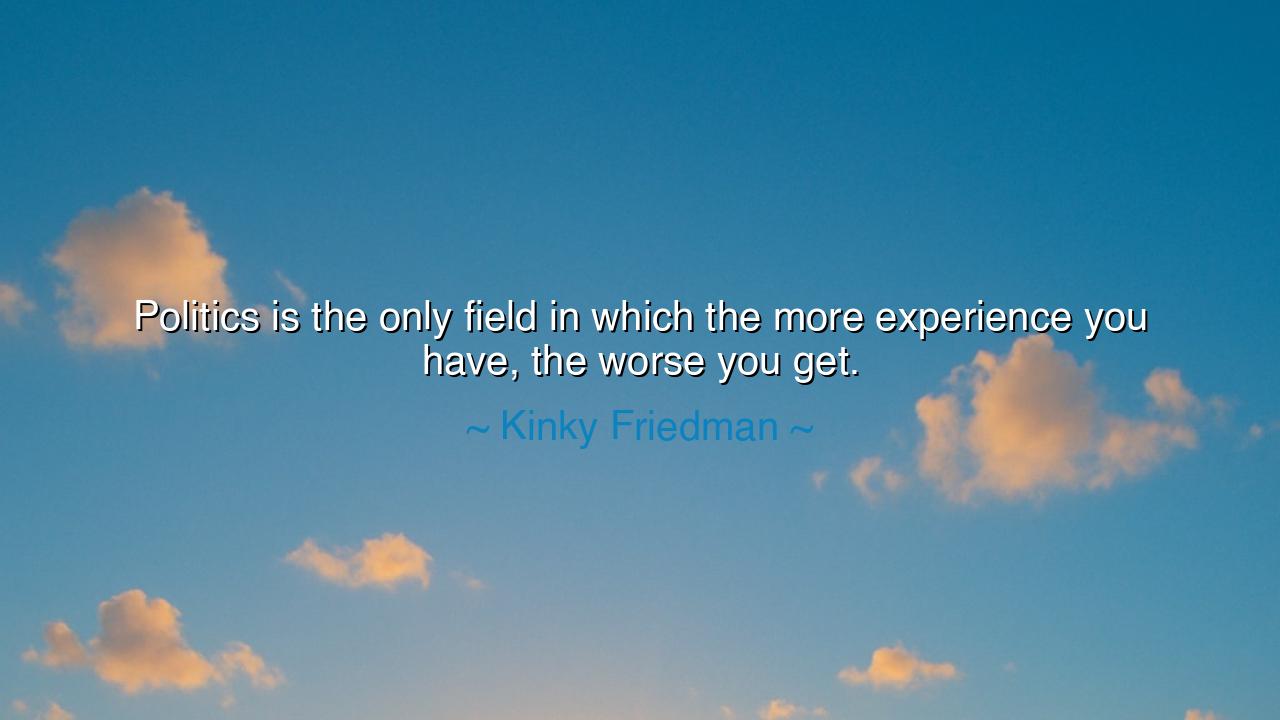
Politics is the only field in which the more experience you






In the words of Kinky Friedman, “Politics is the only field in which the more experience you have, the worse you get.” we hear the laughter of satire mingled with the soberness of truth. Friedman, the Texan musician, writer, and sometime candidate for governor, spoke as a jester of democracy—a man who mocked the mighty with wit. Yet behind his humor lies a profound observation: that in politics, unlike in art, science, or craft, time does not always refine the worker. Instead, it often corrupts. In most fields, wisdom grows with practice; but in politics, too often, experience breeds cunning, compromise, and decay.
The origin of this saying comes from the disillusionment with political systems that Friedman himself saw in America. As an outsider, he could observe what insiders could not admit: that those who linger too long in the corridors of power become entangled in webs of ambition and corruption. What begins as youthful zeal to serve the people may, with years, transform into a lust to preserve one’s seat, one’s prestige, one’s wealth. Thus, the paradox: in politics, experience, instead of being the teacher of wisdom, becomes the corrupter of ideals.
History gives us countless witnesses to this truth. Think of the Roman Republic, where statesmen in their early years sought to defend liberty against kings. Yet as their careers lengthened, men like Sulla and Caesar turned their knowledge of power into tools of domination. The more experience they gained, the more dangerous they became, until the republic itself was shattered. Rome reminds us that political longevity often transforms the guardian into the tyrant.
And yet, this is not merely the tale of Rome. In every nation, the same pattern emerges. Leaders who begin as reformers, blazing with fire for justice, grow weary, cautious, and compromised. They learn how to maneuver, how to flatter, how to disguise their intentions, until they serve not the people but themselves. This is why Friedman’s words sting: he names the tragedy of politics—that knowledge of the system too often replaces the pursuit of truth. Experience does not refine the soul; it trains it to bend.
But let us not despair, O listener. For Friedman’s jest also serves as a warning, and warnings are gifts. If politics tends to corrupt those who linger too long, then the people must guard against the endless reign of career politicians. Rotation, accountability, and the renewal of leadership become the tools by which democracy protects itself. Just as stagnant water breeds disease, stagnant leadership breeds corruption. The cure is not to abandon politics, but to keep it alive with fresh voices, new energy, and citizens who refuse to be passive.
The deeper lesson is this: never assume that age in politics equals virtue. Do not be dazzled by long careers or swollen titles. Instead, ask whether the flame of service still burns within the leader, or whether it has been replaced by the cold hunger of self-preservation. Honor experience only when it is joined to integrity; otherwise, remember that the wisdom of the inexperienced may shine brighter than the cunning of the seasoned.
As for practical action: demand accountability from leaders, limit the power of office-holders through law, and encourage renewal in public life. Do not mock youth for inexperience, for often the uncorrupted heart sees more clearly than the calculating veteran. And in your own life, guard yourself from the corruption of habit: let every new day be a return to your first principles, lest your “experience” lead you to complacency.
Thus, Friedman’s humor carries the weight of prophecy. “Politics is the only field in which the more experience you have, the worse you get.” It is a jest, but one sharpened by the truth of history. Let it remind us that the measure of a leader is not how long they have walked in power, but whether they still walk in service. For in politics, as in life, the years can either polish the soul—or corrode it. The choice belongs to the one who holds the power, and the vigilance belongs to those who grant it.






AAdministratorAdministrator
Welcome, honored guests. Please leave a comment, we will respond soon